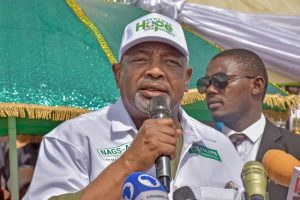The Federal Government of Nigeria says it is adopting new approaches to monitor and increase agricultural productivity, to address food insecurity in the country.

Chief Uche Nnaji, Minister of Innovation, Science and Technology, said this on Tuesday, July 2, 2024, at the opening ceremony of a four-day workshop on CropWatch Innovative Cooperative Programme (CropWatch-ICP) in Abuja.
The regional workshop focused on “Advancing Satellite-Based Crop Monitoring to Increase Resilience in the face of Global Food Insecurity.”
The workshop is organised by the National Space Research and Development Agency (NASRDA), in collaboration with Aerospace Information Research Institute of Chinese Academy of Sciences (AIR-CAS).
Other collaborators are the UN Conference on Trade and Development (UNCTAD) and Alliance of International Science Organisations (ANSO).
Nnaji said the workshop was aimed at sharing knowledge of data for smart and precision agriculture.
Represented by Mrs Esuabana Nko, Permanent Secretary in the ministry, Nnaji said that food insecurity had been a major issue in West Africa.
He said the deployment of space technology could address the growing food demands.
“Agricultural production systems need profound transformation through technolo-Earth Observation (EO) techniques.
“With rapid developments in artificial intelligence, robotics, and nano-satellites, we are adopting new approaches for monitoring and increasing agricultural productivity.
“These include regenerative and sustainable agriculture, and Carbon Dioxide Reduction (CDR) methods,” he said.
The minister emphasised the need for African nations to partner in order to ensure food security, agricultural sustainability through exploring space technologies.
The Director-General of NASRDA, Dr Matthew Adepoju, recalled that UN’s projections of the world population to increase to 9.5 billion by 2050, which food production was expected to increase by 70 per cent to meet the demand.
Adepoju said that space, science and technology played a critical role in revolutionising agriculture.
“It provides the tools and methods necessary for a sustainable agricultural future by providing up-to-date information on sustainable farming practices through scientific research.
“Technology bridges the gap between scientific research and practical application, enabling the implementation of innovative solutions.
“Space technology is significantly impacting agriculture and has the potential to transform the sector by 2030.
“By utilising GPS, drones, satellite images, and data analytics to optimise resource use and reduce environmental impact by minimising waste and preventing overuse, space technology,” he said.
Nnaji said this would provide data on crop phenology, plant nutrition, water optimisation, soil health, crop health, and yields,” he said.
According to him, let us embrace the transformative power of science, technology, and innovation to create a future where agriculture in developing countries is resilient, productive, and sustainable.
The Director-General of AIR-CAS, Prof. Yirong Wu, commended Nigeria on its CropWatch-ICP achievements, saying that the workshop would showcase such to other African countries to key-in.
Wu added that AIR-CAS would launch a CropWatch-ICP regional centre for West Africa which would be domiciled in NASRDA.
According to him, Nigeria will provide the technical assistance for other West African countries on crop management and productivity.
Ms Haihua Gong, Director, Division of Asian and African Affairs, CAS, said the programme would enable African countries to reduce dependence on foreign data on agriculture which could be unverified, leading to delayed decision making.
Gong said: “This programme will provide essential data and information to increase resilience to natural disaster under climate change and help improve agricultural diversification and sustainability.”
Mrs Liping Zhang, Chief of Science, Technology and Development Section, UNCTAD, said adopting the CropWatch programme in developing countries would help to achieve the Sustainable Development Goals one, two and three.
Mr Mohammed Fall, UN Resident Coordinator for Nigeria, recalled that the Food and Agricultural Office (FAO) projected 32 million Nigerians to face hunger in 2023.
Fall said that if necessary steps are not taken to ensure food security in two years to come, about 82 million Nigerians would be on the border line to phase three food insecurity.
Highlight of the event was the inauguration of the CropWatch-ICP Regional Centre for West Africa.
By Ijeoma Olorunfemi
